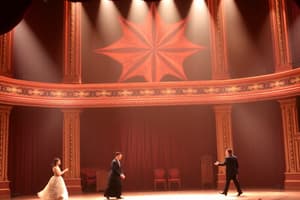Podcast
Questions and Answers
These organizations took over the presentation of scenes from the clergy.
These organizations took over the presentation of scenes from the clergy.
- Craft guilds (correct)
- Noble families
- Royal courts
- Merchant associations
When did the first scene of a mass take place?
When did the first scene of a mass take place?
Easter
Carts used to present plays were called _____ wagons.
Carts used to present plays were called _____ wagons.
pageant
Each cycle told a ____ story.
Each cycle told a ____ story.
Tropes told stories from this book.
Tropes told stories from this book.
This pope moved the plays outside the church.
This pope moved the plays outside the church.
At the beginning of the Middle Ages, only____ players continued to perform.
At the beginning of the Middle Ages, only____ players continued to perform.
At first, the church allowed theatre.
At first, the church allowed theatre.
Theatre was at its peak during this time.
Theatre was at its peak during this time.
Short religious scenes presented together became known as_______.
Short religious scenes presented together became known as_______.
This group watched the cycles.
This group watched the cycles.
A short scene inserted into the church service.
A short scene inserted into the church service.
By the end of the Middle Ages, this type of play was being produced.
By the end of the Middle Ages, this type of play was being produced.
The first scene to be portrayed in a church showed this.
The first scene to be portrayed in a church showed this.
Another name for the Middle Ages.
Another name for the Middle Ages.
Eventually, the presentation of scenes was moved here.
Eventually, the presentation of scenes was moved here.
This was sometimes built on the steps of the church; entire cycles could be performed on it.
This was sometimes built on the steps of the church; entire cycles could be performed on it.
These men were the first actors in Medieval drama.
These men were the first actors in Medieval drama.
As tropes grew in popularity, they became more _______.
As tropes grew in popularity, they became more _______.
Flashcards are hidden until you start studying
Study Notes
Historical Context of Theatre
- Craft guilds took over the presentation of theatrical scenes originally performed by the clergy.
- During the Middle Ages, the church outlawed theatre, impacting its development.
- The Greek Era marked the peak of theatrical performance and artistry.
Festivals and Presentations
- Easter was the time when the first scene of a mass was presented, aligning with the Christian liturgical calendar.
- Pageant wagons were used to transport and present plays, enhancing mobility in performances.
Structure of Performances
- Each cycle of plays told a complete story, allowing for a cohesive narrative.
- Tropes were short scenes inserted into church services, often derived from biblical stories.
Shifts in Performance Locations
- Pope Innocent moved theatrical performances outside of church venues, indicating a shift towards public performances.
- Eventually, stages were constructed outdoors, allowing entire cycles to be depicted in a public setting.
Audience Engagement
- The congregation served as the audience for the cycles, highlighting the communal aspect of these performances.
- By the end of the Middle Ages, secular plays emerged, indicating a transition towards non-religious themes in theatre.
Development of Theatre Form and Content
- The first scene portrayed in a church was the Resurrection, emphasizing the religious roots of early theatre.
- As tropes gained popularity, they became more elaborate, reflecting the evolving complexity of performances.
Terminology and Key Figures
- The term "cycles" refers to a collection of short religious scenes presented together, providing variety and depth.
- Priests were among the first actors in Medieval drama, blending their religious roles with performance art.
- The Middle Ages is alternatively known as the Medieval period, encapsulating a significant era in theatrical history.
Studying That Suits You
Use AI to generate personalized quizzes and flashcards to suit your learning preferences.




